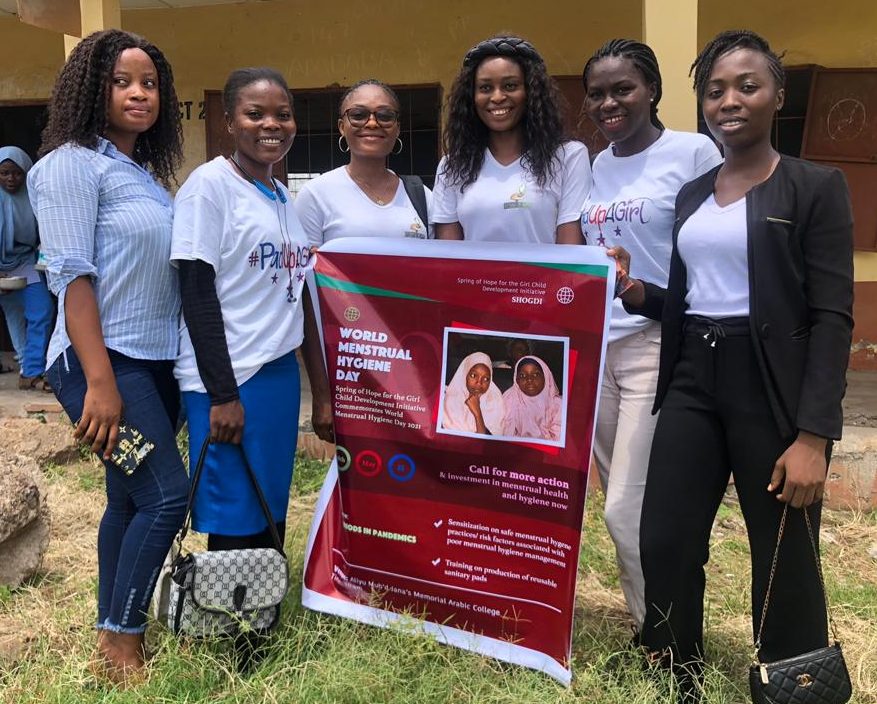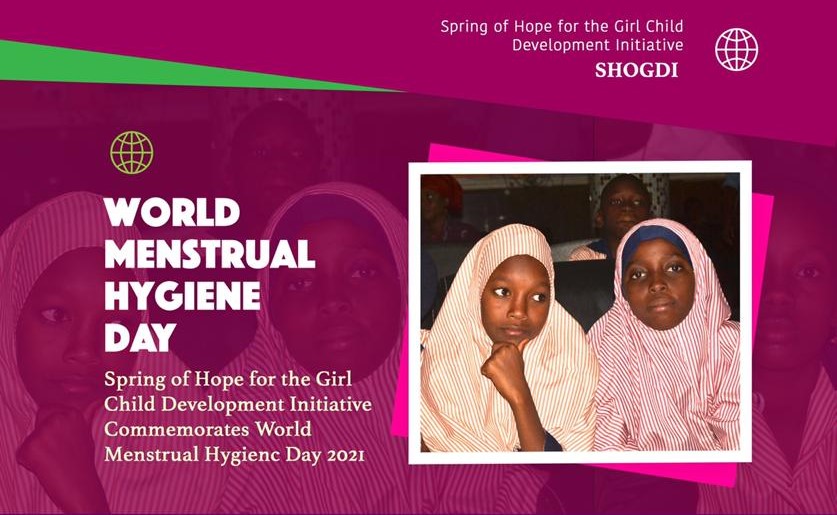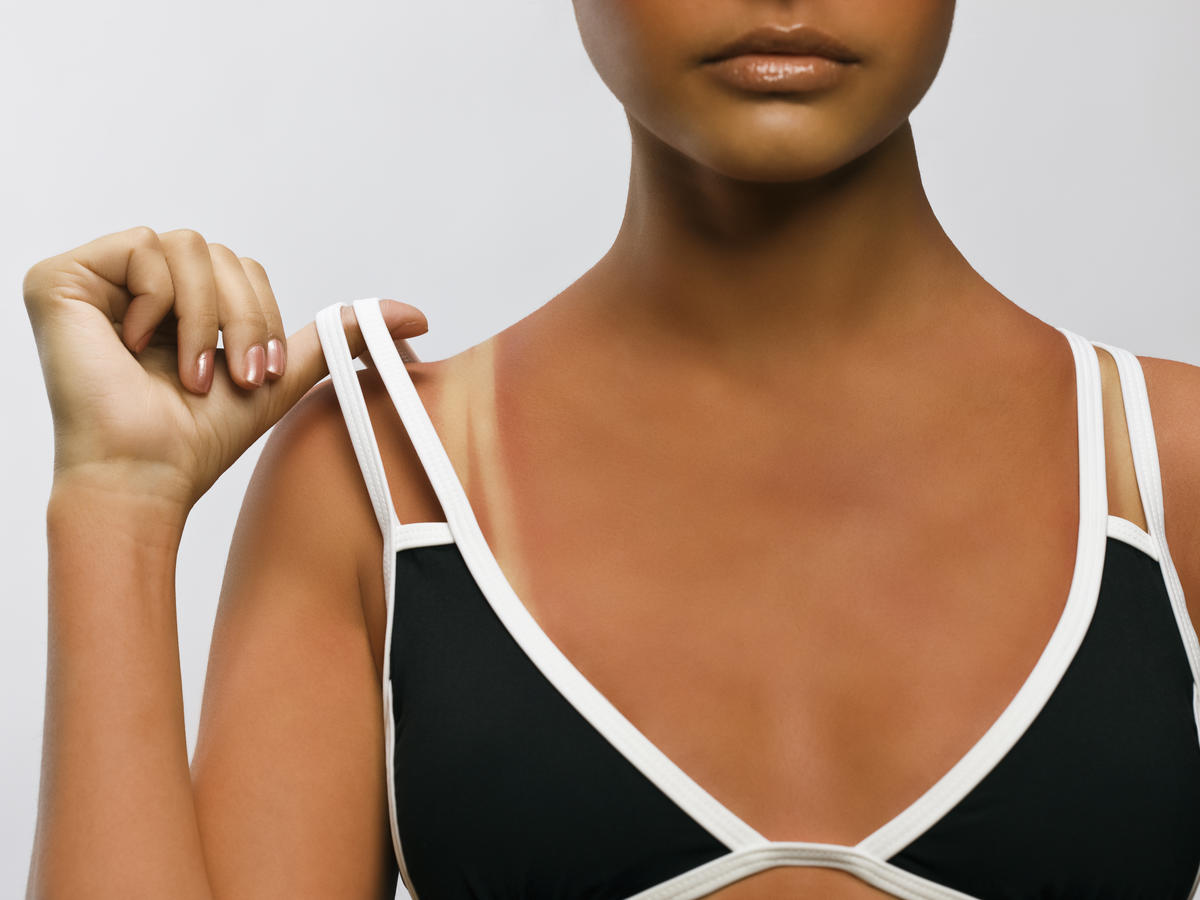By Kennedy Eberechi.

Yesterday, May 28th, the world observed the Menstrual Hygiene Day (MHD) with aims of changing the social stigma associated with menstruation. The date May 28 was chosen to observe the day because on an average, the menstrual cycle for most women is 28 days and the menstruation period for most women is for five days.
Specifically, the day serves as a global advocacy platform to bring together the voices and actions of non-profits, government agencies, individuals, the private sector and the media to promote good menstrual health and hygiene (MHH) for all women and girls.
In recognition of this, and as part of its continued efforts in advocating for all that concerns women and girls’ health/general wellbeing through projects and engagements; the foremost Girl-Child advocacy group; Spring of Hope For the Girl-Child Development Initiative (SHoGDI) carried out an advocacy and sensitization campaign at the Aliyu Muh’ Jana’s Arabic College in Markudi Benue state wherein adolescent girls were sensitized on safe menstrual practices in addition to training on production of reusable sanitary pads.
In her remarks, the Founder and Executive Director of SHoGDI; Uhundu Mimidoo stated that menstruation is not a problem, but poor menstrual hygiene is, just as she added that poor menstrual health is one of the major reasons for the prevalence of Reproductive Tract Infections (RTIs) in Nigeria and Africa, which according to her contributes significantly to female morbidity.

“Today we join our voices to eradicate the stigma associated with menstruation and call for more action and investment in menstrual health and hygiene. The objective is to build the capacity of young adolescent girls so they would be able to observe safe menstrual hygiene. As we are all aware, covid-19 came and the economic impact is being felt by everyone, and so a lot of young girls cannot afford the disposable sanitary pads.
“Therefore, in-line with the theme of this year’s edition of MHD which is ‘Periods in Pandemics’, SHoGDI has deemed it timely to train girls on production of reusable sanitary pads which is more economical and can be reused”, Miss Uhundu explained.
Continuing, the Ex-beauty Queen informed that menstrual hygiene management (MHM), which refers to access to menstrual hygiene products to absorb or collect the flow of blood during menstruation, privacy to change the materials, and access to facilities to dispose of used menstrual management materials, could also include the “broader systemic factors that link menstruation with health, well-being, gender equality, education, equity, empowerment, and rights”.
Mimidoo further observed that menstrual hygiene management can be particularly challenging for girls and women in developing countries, where clean water and toilet facilities are often inadequate. “Menstrual waste is largely ignored in schools in developing countries, despite it being a significant problem. Menstruation can be a barrier to education for many girls, as a lack of effective sanitary products restricts girls’ involvement in educational and social activities.

“Therefore MHD creates an occasion for publicizing information about menstrual hygiene management issues in the media. This day offers an opportunity to actively advocate for the integration of menstrual hygiene management into global, national and local policies and programmes”, Miss Uhundu explained.
Other highlights of the event as put together by SHoGDI included training exercise on production of reusable sanitary pads by Xtreme Vogue, distribution of reusable sanitary pads to the project beneficiaries, sensitization on reproductive health, stigma and cultural taboos associated with menstruation by Lawyers Alert, and a cross section of questions and answers.
Broadly, Menstrual Hygiene Day breaks the silence, raises awareness and changes negative social norms around MHH. It also engages decision-makers to increase the political priority and catalyse action for MHH, at global, national and local levels.
Observably, with constant engagements from advocacy groups such as the Spring of Hope for The Girl-Child Development Initiative, Menstrual Hygiene Day has grown tremendously since its first celebration in 2014.




